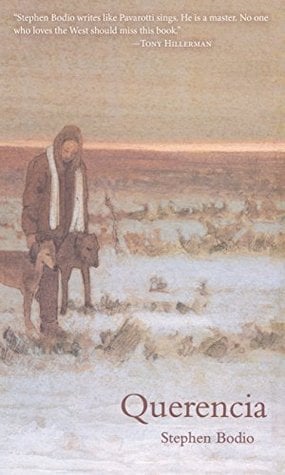The literary map of New Mexico includes the names of many wellknown writers. To the north, in the heavily publicized vicinity of Santa Fe and Taos, are Rudolfo Anaya, John Nichols, Haniel Long, Erna Fergusson, Mary Austin, Paul Horgan. Dotting the redrock canyons and high mesas of the west are a roster of Native Americans: Leslie Marmon Silko, Simon Ortiz, N. Scott Momaday, Luci Tapahonso. To the south, in the dusty Tularosa Valley where Billy the Kid made his way into history, lies the territory of Eugene Manlove Rhodes. Nearby, one finds Ross Calvin and, every now and again, Larry McMurtry.
The map is pitch-black with ink everywhere but the section marking the high grasslands to the north of the Black Mountains, between Socorro and Springerville on the Arizona line. This stretch of west-central New Mexico is fine, mile-plus-high, lonesome country, visited by archivists of the Farm Security Administration in the 1930’s and by astronomers from around the world today, who come by to check in on the so-called Very Large Array of radio telescopes (featured in the film 2010) near the hamlet of Magdalena. Apart from the occasional hunter and a few scattered ranch families, the area doesn’t see much in the way of human beings.
In the late 1970’s, Stephen Bodio, a Boston-based writer, amateur naturalist, and falconer, happened into Magdalena on the way somewhere else. He never left. With his friend Betsy Huntington, and an assortment of birds, dogs, snakes, and books, he took up residence in a ramshackle two-story house along U.S. 60 and set out to live in the way of country people. Querencia—the Spanish term means something like “the tiny pocket of one’s inner life where one is truly at home”—details a decade of life on the plains of San Agusti’n, a hitherto unchronicled land.
Initially suspicious of the newcomers, as highlanders will be, the people of Magdalena and the surrounding plains opened to Stephen and Betsy as soon as it became apparent that they were neither anthropologists studying a bizarre foreign culture nor afraid of honest work—building fences, mending cattle tanks, slaughtering pigs (“The only thing that bothered me was how the other pigs watch,” Betsy admits), tending to farm animals, hunting game. Throughout the early pages of his memoir, Stephen finds himself tested by the locals for his knowledge of raptor birds, of snakes, of dogs. When he begins to pass the tests easily, his transformation is complete, earning him a distinguished seat at the Silver Spur saloon, a home, a place in the heart.
Querencia offers a fine brief on rural living, alternately reveling in country matters and acknowledging the difficulties involved in such exercises as luring cows home from the mountain wilderness into which they’ve strayed while steering clear of venomous reptiles and combative bull elk. But this is no back-to-the-land paean. Bodio’s eyes are wide open:
Had we any lingering romanticism it would have been cured by circumstances; in those years our combined annual income would not exceed $12,000, and an ancient house on a remote plateau exacts its toll in colds and unpaid bills, in unrepaired machinery and teeth and animals. Still: we believed with our neighbors that our querencia held some parts of a real life worth living, full of good and gritty things that coastal civilization attempted to deny, ignore, or paper over. We decided, not for the first or last time, that this was the place.
Hardships abound in the highlands, and not only of the mere character-building sort. Querencia is in the end tragic—to say why would be to rob the book of its strongest moments—but it is equally celebratory of lives spent well in the reality of juniper-scented wind, lightning bursts, and good hot chili, lives free of bosses and bureaucrats. In the end, one cannot help but admire Stephen Bodio and Betsy Huntington for having indeed had the rare fortune of finding, in the middle of their personal toils and this churned-up civilization of ours, a peaceful center.
[Querencia, by Stephen Bodio (Livingston, Montana: Clark City Press) 154 pp., $12.95]

Leave a Reply